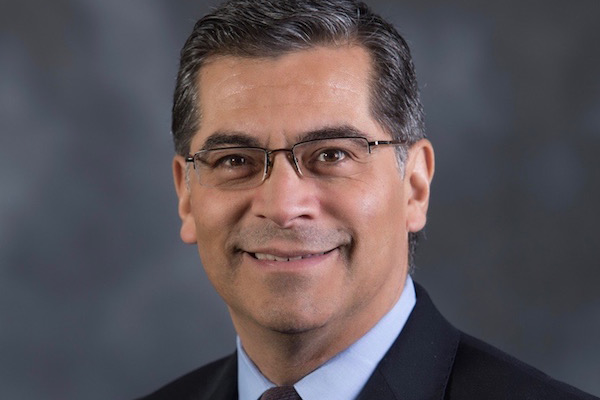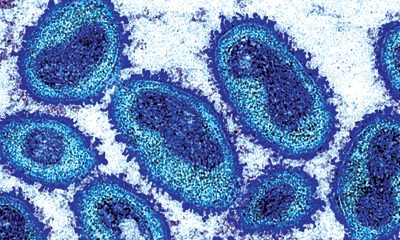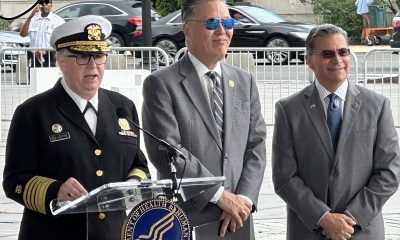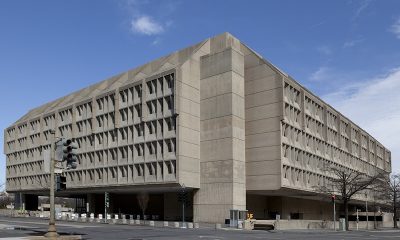National
Becerra gets defensive over Biden administration’s approach to monkeypox
HHS sec’y vaguely blames localities and ‘communities at risk’

The Biden administration’s top health official got defensive on Thursday in response to questions about its response to monkeypox, suggesting localities and “communities at risk” weren’t doing enough on prevention efforts and asserting the federal government has “done our homework” in addressing the outbreak.
Secretary of Health & Human Services Xavier Becerra made the comments during a conference call with reporters intended to highlight the federal procurement of an additional 786,000 JYNNEOS vaccines from Bavarian Nordic, which are designed to protect against smallpox and monkeypox, amid concerns over a lack of supply causing localities to restrict access to the shots.
When reporters started asking questions about whether the U.S. government could eliminate monkeypox, or simply get ahead of it and whether the disease would become endemic in the United States, Becerra became defensive and downplayed concerns about vaccine availability.
“I almost want to turn that question back at you…and ask you how many vaccines do you think we need at this stage?” Becerra said. “Now there are 330 million Americans. We could try to vaccinate all 330 million but as we’ve seen with COVID, which is far deadlier. There’s not a person who’s died from monkeypox. We’ve lost over a million people from COVID. We still haven’t seen every American get vaccinated with a vaccine that has proven itself to be effective to keep people alive.”
Although challenges have persisted in getting Americans to take now widely available COVID vaccines, the problem with the monkeypox vaccine is supply not meeting demand. The D.C. government announced it would temporarily discontinue a two-shot strategy and offer one shot, which is below the recommended federal guidelines, unless a patient is considered high risk. D.C. Health officials have said the first dose is effective for six months and they anticipate having enough vaccine within that time frame to administer the second doses. Critics have said the Biden administration has not sufficiently ramped up efforts to make vaccines widely available for a disease that has been around since the 1950s.
Meanwhile, the number of cases of monkeypox in the United States, which have occurred almost entirely among men who have sex with men, has reached 3,591. The number of cases is now the highest anywhere in the world.
“So on monkeypox, there are so far less than 5,000 cases reported,” Becerra continued. “So we’ve already made available to jurisdictions throughout the country more than 330,000 vaccines and today we’re announcing that another 786,000 are available. How many more vaccines would you say we need today?”
That’s when Becerra appeared to shift blame over criticism to the government response to localities and “communities at risk,” suggesting they weren’t doing enough to prevent monkeypox. Although Becerra didn’t elaborate exactly on what he meant by prevention for monkeypox, nor “communities at risk,” he compared such efforts to social distancing and masks during the coronavirus pandemic.
“If the response is we’re not going to expect any type of prevention work by the communities at risk, by the state and local officials, then chances are we’re going to have to go to the really high numbers of vaccines,” Becerra said. “But if everyone does their work, and remember containing the virus requires a lot of preventative work — as you know we did masks, that’s why we did social distancing with COVID — we know what we need to do pretty well on monkeypox.”
Becerra went on to promote the federal government’s efforts on monkeypox as rising to the moment, continuing to say state and local officials were responsible for not getting vaccines to populations in need.
“And so to the question: Can we not only stay ahead of this virus, but end this outbreak? Absolutely,” Becerra said. “And we believe that we have done everything we can at the federal level to work with our state and local partners and communities affected to make sure we can stay ahead of this and end this outbreak, but everybody’s got to take the oar and row. Everybody’s got to do their part. We don’t control, as you can see from our lack of data that we’ve gotten from jurisdictions, what they’re doing with their vaccines. We don’t have the authority to tell them what to do. We need them to work with us. And so, I would say that if you’re asking students in the classroom who did their homework, I will raise my hand and say that at HHS, we’ve done our homework.”
Lindsay Dawson, associate director of HIV Policy and director of LGBTQ Health Policy at the Kaiser Family Foundation, told the Washington Blade in response to Becerra’s comments the secretary has a point about the role of localities, but said current problems are at least partly attributed to “barriers at the federal level.”
“Responding to infectious disease outbreaks, including monkeypox, often requires a joint federal and state or local response,” Dawson said. “It is certainly true that local governments have a significant role to play in curbing the current outbreak and that the different decisions they make will likely foreshadow their success to some degree. That said, many of the primary tools to address the monkeypox outbreak, particularly vaccination and treatment, remain limited to date due, at least in part, to barriers at the federal level. Limited access to these tools could challenge local communities in mounting a comprehensive response in the immediate term.”

The Comings & Goings column is about sharing the professional successes of our community. We want to recognize those landing new jobs, new clients for their business, joining boards of organizations and other achievements. Please share your successes with us at [email protected].
Congratulations to Gil Pontes III on his recent appointment to the Financial Advisory Board for the City of Wilton Manors, Fla. Upon being appointed he said, “I’m honored to join the Financial Advisory Board for the City of Wilton Manors at such an important moment for our community. In my role as Executive Director of the NextGen Chamber of Commerce, I spend much of my time focused on economic growth, fiscal sustainability, and the long-term competitiveness of emerging business leaders. I look forward to bringing that perspective to Wilton Manors — helping ensure responsible stewardship of public resources while supporting a vibrant, inclusive local economy.”
Pontes is a nonprofit executive with years of development, operations, budget, management, and strategic planning experience in 501(c)(3), 501(c)(4), and political organizations. Pontes is currently executive director of NextGen, Chamber of Commerce. NextGen Chamber’s mission is to “empower emerging business leaders by generating insights, encouraging engagement, and nurturing leadership development to shape the future economy.” Prior to that he served as managing director of The Nora Project, and director of development also at The Nora Project. He has held a number of other positions including Major Gifts Officer, Thundermist Health Center, and has worked in both real estate and banking including as Business Solutions Adviser, Ironwood Financial. For three years he was a Selectman, Town of Berkley, Mass. In that role, he managed HR and general governance for town government. There were 200+ staff and 6,500 constituents. He balanced a $20,000,000 budget annually, established an Economic Development Committee, and hired the first town administrator.
Pontes earned his bachelor’s degree in political science from the University of Massachusetts, Dartmouth.
Kansas
ACLU sues Kansas over law invalidating trans residents’ IDs
A new Kansas bill requires transgender residents to have their driver’s licenses reflect their sex assigned at birth, invalidating current licenses.

Transgender people across Kansas received letters in the mail on Wednesday demanding the immediate surrender of their driver’s licenses following passage of one of the harshest transgender bathroom bans in the nation. Now the American Civil Liberties Union is filing a lawsuit to block the ban and protect transgender residents from what advocates describe as “sweeping” and “punitive” consequences.
Independent journalist Erin Reed broke the story Wednesday after lawmakers approved House Substitute for Senate Bill 244. In her reporting, Reed included a photo of the letter sent to transgender Kansans, requiring them to obtain a driver’s license that reflects their sex assigned at birth rather than the gender with which they identify.
According to the reporting, transgender Kansans must surrender their driver’s licenses and that their current credentials — regardless of expiration date — will be considered invalid upon the law’s publication. The move effectively nullifies previously issued identification documents, creating immediate uncertainty for those impacted.
House Substitute for Senate Bill 244 also stipulates that any transgender person caught driving without a valid license could face a class B misdemeanor, punishable by up to six months in jail and a $1,000 fine. That potential penalty adds a criminal dimension to what began as an administrative action. It also compounds the legal risks for transgender Kansans, as the state already requires county jails to house inmates according to sex assigned at birth — a policy that advocates say can place transgender detainees at heightened risk.
Beyond identification issues, SB 244 not only bans transgender people from using restrooms that match their gender identity in government buildings — including libraries, courthouses, state parks, hospitals, and interstate rest stops — with the possibility for criminal penalties, but also allows for what critics have described as a “bathroom bounty hunter” provision. The measure permits anyone who encounters a transgender person in a restroom — including potentially in private businesses — to sue them for large sums of money, dramatically expanding the scope of enforcement beyond government authorities.
The lawsuit challenging SB 244 was filed today in the District Court of Douglas County on behalf of anonymous plaintiffs Daniel Doe and Matthew Moe by the American Civil Liberties Union, the ACLU of Kansas, and Ballard Spahr LLP. The complaint argues that SB 244 violates the Kansas Constitution’s protections for personal autonomy, privacy, equality under the law, due process, and freedom of speech.
Additionally, the American Civil Liberties Union filed a temporary restraining order on behalf of the anonymous plaintiffs, arguing that the order — followed by a temporary injunction — is necessary to prevent the “irreparable harm” that would result from SB 244.
State Rep. Abi Boatman, a Wichita Democrat and the only transgender member of the Kansas Legislature, told the Kansas City Star on Wednesday that “persecution is the point.”
“This legislation is a direct attack on the dignity and humanity of transgender Kansans,” said Monica Bennett, legal director of the ACLU of Kansas. “It undermines our state’s strong constitutional protections against government overreach and persecution.”
“SB 244 is a cruel and craven threat to public safety all in the name of fostering fear, division, and paranoia,” said Harper Seldin, senior staff attorney for the ACLU’s LGBTQ & HIV Rights Project. “The invalidation of state-issued IDs threatens to out transgender people against their will every time they apply for a job, rent an apartment, or interact with police. Taken as a whole, SB 244 is a transparent attempt to deny transgender people autonomy over their own identities and push them out of public life altogether.”
“SB 244 presents a state-sanctioned attack on transgender people aimed at silencing, dehumanizing, and alienating Kansans whose gender identity does not conform to the state legislature’s preferences,” said Heather St. Clair, a Ballard Spahr litigator working on the case. “Ballard Spahr is committed to standing with the ACLU and the plaintiffs in fighting on behalf of transgender Kansans for a remedy against the injustices presented by SB 244, and is dedicated to protecting the constitutional rights jeopardized by this new law.”
National
After layoffs at Advocate, parent company acquires ‘Them’ from Conde Nast
Top editorial staff let go last week

Former staff members at the Advocate and Out magazines revealed that parent company Equalpride laid off a number of employees late last week.
Those let go included Advocate editor-in-chief Alex Cooper, Pride.com editor-in-chief Rachel Shatto, brand partnerships manager Erin Manley, community editor Marie-Adélina de la Ferriére, and Out magazine staff writers Moises Mendez and Bernardo Sim, according to a report in Hollywood Reporter.
Cooper, who joined the company in 2021, posted to social media that, “Few people have had the privilege of leading this legendary LGBTQ+ news outlet, and I’m deeply honored to have been one of them. To my team: thank you for the last four years. You’ve been the best. For those also affected today, please let me know how I can support you.”
The Advocate’s PR firm when reached by the Blade said it no longer represents the company. Emails to the Advocate went unanswered.
Equalpride on Friday announced it acquired “Them,” a digital LGBTQ outlet founded in 2017 by Conde Nast.
“Equalpride exists to elevate, celebrate and protect LGBTQ+ storytelling at scale,” Equalpride CEO Mark Berryhill said according to Hollywood Reporter. “By combining the strengths of our brands with this respected digital platform, we’re creating a unified ecosystem that delivers even more impact for our audiences, advertisers, and community partners.”
It’s not clear if “Them” staff would take over editorial responsibilities for the Advocate and Out.
-

 Federal Government5 days ago
Federal Government5 days agoTwo very different views of the State of the Union
-

 Virginia5 days ago
Virginia5 days agoVa. activists preparing campaign in support of repealing marriage amendment
-

 Opinions4 days ago
Opinions4 days agoThe global cost of Trump’s foreign aid ideology
-

 Opinions3 days ago
Opinions3 days agoCriteria for supporting a candidate in D.C.




















